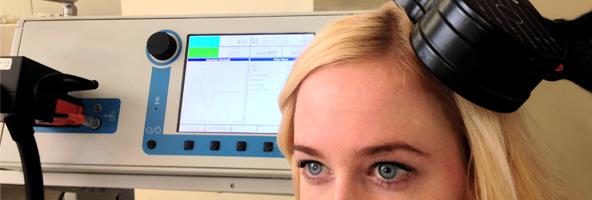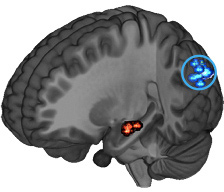Magnetic brain stimulation improves a precise type of memory
January 20, 2017

An individual receiving noninvasive rTMS brain stimulation via electromagnetic coil (credit: Northwestern University)
Non-invasive magnetic brain stimulation can be used to precisely improve a specific type of memory — remembering highly precise contextual and spatial information — Northwestern Medicine scientists shown for the first time.
The new research could help in developing new treatments for people with brain injuries or dementia, said Joel Voss, assistant professor of medical social sciences at Northwestern University Feinberg School of Medicine, senior author of a paper published Jan. 19 in Current Biology.

Blue indicates where electromagnetic pulses were applied to modify the specific “core” (red) of a precise memory network in the hippocampus. (credit: Northwestern University)
Precise memory (known as “recollection precision”), rather than general memory, is critical for knowing details such as the specific color, shape, and location of a building you are looking for, rather than simply knowing the part of town it’s in. This type of memory is crucial for normal functioning, and it is often lost in people with serious memory disorders.
Improving the spatial-precision-memory part of the brain
“We show that it is possible to target the portion of the brain responsible for this type of memory and to improve it,” said Voss. “People with brain injuries have problems with precise memory as do individuals with dementia, and so our findings could be useful in for these conditions.”
The scientists first used MRI to identify brain networks related to spatial precision memory. Then they stimulated the specific brain network responsible for spatial memory* with repetitive transcranial magnetic stimulation (rTMS), using powerful electromagnets. That allowed the scientists to improve the precision of people’s memory for identifying locations. This benefit lasted a full 24 hours after receiving stimulation and corresponded to changes in brain activity.
Most previous studies using noninvasive magnetic brain stimulation have found only very general and short-lived effects on thinking abilities, rather than highly specific and long-lasting effects on an ability such as precise memory. The scientists used detailed memory tests to show that this procedure actually improved spatial-precision memory; they used EEG to show that these memory improvements corresponded to indicators of improved brain network function.
The research was supported by grants from the National Institute of Mental Health, the National Institute on Aging and the National Institute of Neurological Disorders and Stroke, all of the National Institutes of Health.
* The “hippocampal posterior-medial (HPM) network” (for which evidence has previously been mostly indirect, derived from correlative measures such as EEG neural-activity recordings).
Abstract of Stimulation of the Posterior Cortical-Hippocampal Network Enhances Precision of Memory Recollection
Episodic memory is thought to critically depend on interaction of the hippocampus with distributed brain regions [ 1–3 ]. Specific contributions of distinct networks have been hypothesized, with the hippocampal posterior-medial (HPM) network implicated in the recollection of highly precise contextual and spatial information [ 3–6 ]. Current evidence for HPM specialization is mostly indirect, derived from correlative measures such as neural activity recordings. Here we tested the causal role of the HPM network in recollection using network-targeted noninvasive brain stimulation in humans, which has previously been shown to increase functional connectivity within the HPM network [ 7 ]. Effects of multiple-day electromagnetic stimulation were assessed using an object-location memory task that segregated recollection precision from general recollection success. HPM network-targeted stimulation produced lasting (∼24 hr) enhancement of recollection precision, without effects on general success. Canonical neural correlates of recollection [ 8–10 ] were also modulated by stimulation. Late-positive evoked potential amplitude and theta-alpha oscillatory power were reduced, suggesting that stimulation can improve memory through enhanced reactivation of detailed visuospatial information at retrieval. The HPM network was thus specifically implicated in the processing of fine-grained memory detail, supporting functional specialization of hippocampal-cortical networks. These findings demonstrate that brain networks can be causally linked to distinct and specific neurocognitive functions and suggest mechanisms for long-lasting changes in memory due to network-targeted stimulation.